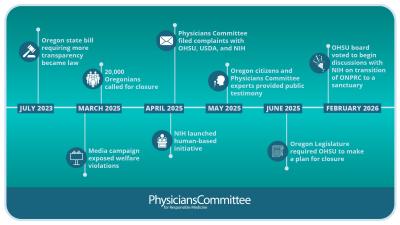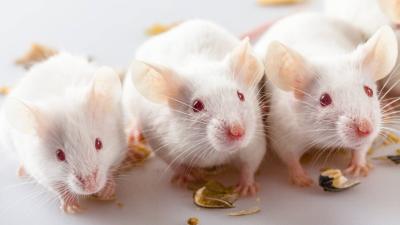Six Ways You Can Save Animals Now

Below are six steps you can take today to help save countless animal lives. By supporting our work, you are helping us make a difference.
1. Lobby Your Member of Congress to Save Animals
The Physicians Committee and supporters have been on Capitol Hill (virtually!), meeting with members of Congress and asking them to urge the National Institutes of Health (NIH) Director and the Food and Drug Administration (FDA) Commissioner to make formal commitments to end animal experimentation.
Write to your members of Congress TODAY to ensure that the NIH and FDA end animal research and testing, replacing it with nonanimal and human-relevant methods instead.
2. Tell Regulatory Agencies and Vaccine Manufacturers To Stop Using Sharks in COVID-19 Vaccine Development
Squalene is an adjuvant, which is an ingredient used in vaccines that works to boost the body’s immune response, thereby making vaccines more effective. Shark-based squalene is extracted from the livers of sharks and traded all over the world for uses in medicine, cosmetics, lamp fuel, leather tanning, and more, in processes that often lack transparency or are outright deceitful. About half of shark species targeted for squalene are vulnerable to extinction.
Squalene can, and should, be derived from nonanimal sources, such as olive oil, sugar cane, wheat germ, bacteria, and yeast, yielding an ingredient that has identical chemical properties as the shark-based version. Alternatives can be produced with great quality control and quickly, meeting commercial demand.
You can make your voice heard and save hundreds of thousands of sharks. Learn more and take action by signing this petition.
3. Tell the National Institutes of Health to Invest in Human-Relevant Research
At the beginning of the pandemic, universities were killing animals deemed “unnecessary” or “extraneous” as they sent staff home in response to the new COVID-19 regulations. This should not have happened, as labs should have had emergency plans in place.
In April, the Physicians Committee filed a petition with the Department of Health and Human Services, which oversees the NIH. The petition argues that the NIH, which doles out more than $15 billion each year to studies involving animals, must take a series of short-term steps to hold labs accountable and other long-term steps to favor human-relevant research and reduce the number of animals in labs.
Make your voice heard; send NIH your concerns.
4. Learn About Nonanimal, Human-Relevant Testing Methods
Human biology-based models for drug and vaccine testing better predict human outcomes because they use human cells, tissues, and biological processes. They also save time, money, and countless animal lives. Learn more about human-relevant models in vaccine development, then share this video with your friends and family!
5. End Animal Use in Advanced Medical Training
Animals used in emergency medicine training, Advanced Trauma Life Support, combat trauma training, and paramedic training are used in numerous invasive procedures, then are killed, either during or at the end of the training. The anatomical differences between animals and humans render this type of training ineffective. Fortunately, the vast majority of medical training uses simulators and other human-relevant methods. Help us increase our impact by signing one of our many action alerts urging universities and other institutions to end animal use in advanced medical training.
6. Adopt a Plant-Based Diet.
Eliminating animal products from your diet will not only save the lives of potentially hundreds animals a year, but it will benefit the environment and your health!
A plant-based diet, rich in fruits, vegetables, whole grains, and legumes is full of fiber, rich in vitamins and minerals, free of cholesterol, and low in calories and saturated fat. Eating a variety of these foods provides all the protein, calcium, and other essential nutrients your body needs. Those who eat a plant-based diet lower their risk for heart disease, type 2 diabetes, obesity, and other health conditions. Research also shows that a plant-based diet can be less expensive that an omnivorous diet.
Start your journey to health, and enroll in the free 21-Day Kickstart!
The Physicians Committee is dedicated to saving and improving human and animal lives through plant-based diets and ethical and effective scientific research. Join us in this mission and become a member today. Your donations allow us to continue our lifesaving work.







